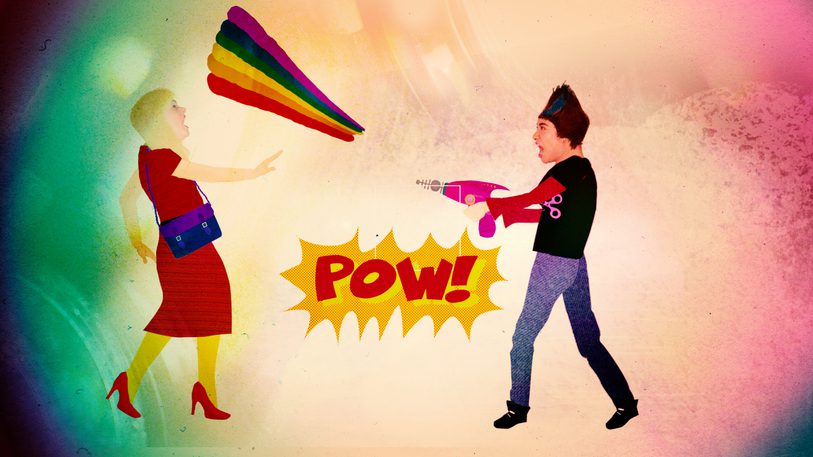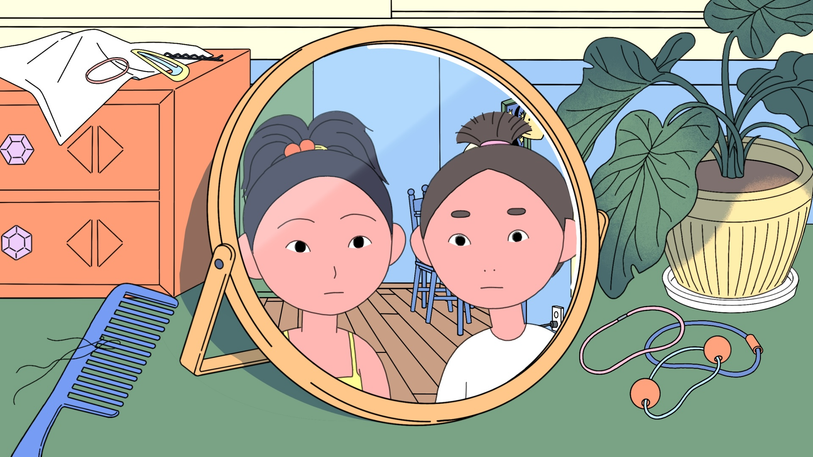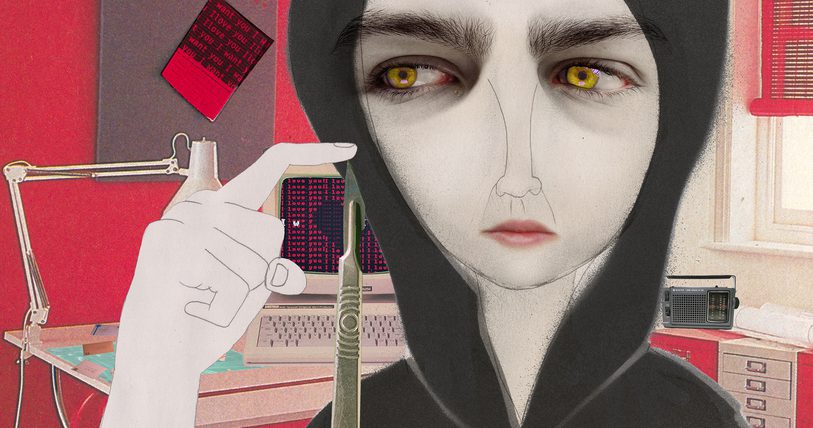In Conversation: LIAF founder, Nag Vladermersky and Film London Animation Consultant, Julian Scott
Latest 26 Nov 2025News Story

To mark this year's London International Animation Festival (LIAF), Film London Animation Consultant Julian Scott sat down with Nag Vladermersky, the festival's founder, director, and chief programmer, to discuss the latest trends and highlights.

The London International Animation Festival (LIAF) has such a distinctive and long-standing history - could you talk through how it first began, and some of the key moments or decisions that have shaped its growth into what it is today?
Yes, it’s hard to believe that this is our 22nd year - it’s flown past! The history of how we began is really quite simple. In the late 1990s/early 2000s I'd been making my own independent animated films for a few years and it was through visiting several festivals around the world that I discovered how wonderful the film festival world was. Film festivals are exciting, vibrant celebrations of cinema, and they offer a unique platform for filmmakers and audiences to come together in meaningful ways - especially, I feel, animation festivals as they connect audiences to filmmakers and their stories that might not otherwise be seen. So I came back to London in the early and through the connections I had made with various independent animators from all over the world and some of the festival directors I had met - in particular Malcolm Turner who was then putting together the animation programmes for the New Zealand Film Festival - I thought I’d put on a weekend of screenings at the now defunct The Other Cinema in Rupert Street, Soho. This was in 2003. Everything was done through word-of-mouth. I printed up some flyers cheaply, told everyone I knew to pass the word around and lo and behold the cinema was packed out - people were curious and wanted to see these weird and wonderful short animated films. It was all very DIY which has always been my ethos and how I approach everything I do. Make it up as you go along and make sure you have fun doing it!
We’ve now grown into a mammoth 10-day event at 5 cinemas across London (and in the last 5 years also screening online), and have had most of the world’s best animators come and visit us over the years to support their films, take part in Q and A’s and meet the audience. We of course now get paid for doing what we love - praise be! - and there’s been some bumpy times along the way, but perseverance is key and also we continue to love discovering new talent and maintaining relationships with some of the more established animators in the field. Independent animation still seems like a bit of an outlier to me and maybe that’s one reason we love what we do so much - it gives us a thrill that our audiences can discover so many hidden gems, and it’s a huge thrill for us too.

Across this year’s submissions, have any notable themes, ideas or stylistic approaches emerged, and do you feel they reflect wider shifts within the animation landscape right now?
Stop-motion is so strong this year. One of our competition programmes is specifically dedicated to stop-motion and it’s always one of the first to sell out. It screens at the ideal location - the Puppet Theatre Barge. In fact this year it has sold out so quickly that we are putting on a repeat screening. And there are so many great stop-motion films this year in particular that we have also sprinkled them through the other main competition programmes. I’m seeing a real trend amongst new animators to work in this form. Stop-motion has a distinct, tactile quality that sets it apart from other forms of animation, and it has a tangible, hand-crafted feel that resonates with audiences. The medium itself - whether using clay, puppets, or even everyday objects - can convey a level of intimacy and creativity that feels more personal and organic than computer-generated animation. Maybe that’s why it's on the up!

When curating the programme, how do you approach the balance between celebrating established filmmakers and creating space for newer voices who may be presenting work for the first time?
It’s really important for us that students and first-time filmmakers have a platform to celebrate their work. Many of the student films we screen are some of the best films in the festival and several have gone on to win the awards we give out each year. We have a stand-alone series of screenings specifically of student work - called the Best of the Next - which are always well-received, and many student films are also sprinkled throughout the rest of the festival as well and especially in the main competition programmes. We have an open call for entries and we judge all films that come to us on their own merit. We don’t take into account whether they are made by first-time filmmakers or more established ones. Each film is judged purely on how we feel it would resonate with our audience. The best student films are the ones where the shackles are off and the filmmakers really push their strong ideas and take risks.

How do the panel discussions, filmmaker Q&As, and networking events contribute to the festival’s identity, and what role do they play in shaping the experience for both audiences and filmmakers?
This is a vital part of the festival experience and something we pay particular attention to at LIAF. Post-screening Q&A sessions, panels, and workshops allow our audience to learn more about the creative process, dive deeper into the themes of the films, and ask questions of the people behind the scenes. This then fosters a more engaged and interactive viewing experience which I feel doesn’t usually take place at more traditional cinema-going events. Animators often work in relative isolation on their projects, especially in independent animation, which can be a long and solitary process. Festivals provide a rare opportunity for them to connect with peers, discuss their work, and get feedback from fellow creators. On the flipside, for an audience, animation, as an art form, can often seem distant or sometimes "magical", especially the distinctly creative works we screen at LIAF. Filmmaker Q&As and panel discussions humanise the creative process by putting faces to the work and revealing the hard work, passion, and struggles behind the animation. The panel discussions often highlight personal journeys of the filmmakers - how they got started, what inspired their work, and the hurdles they faced along the way. And for the animators, sharing personal stories during Q&As can be a powerful way for them to connect emotionally with their audience. It gives them a chance to express their artistic vision and provide context for their films. It’s very much a two-way exchange and something that is increasingly important for LIAF.

What steps does the festival take to ensure a genuinely diverse range of voices, styles and cultural perspectives are represented each year?
It’s something that is front and centre at LIAF. We have several programmes that deal with under-represented groups such as Figures in Focus, the programme that Abigail Addison has been curating for us for the past 7 years, which screens films made by female and non-binary animators. Every year there is a different theme but the over-riding unity is that they showcase some of the incredible work rarely seen by some of the most talented filmmakers, both from the UK and internationally.
Also Disrupting the Narrative, a programme of films co-curated by Osbert Parker which puts a spotlight on ethnically diverse filmmakers from around the world including several under-represented countries. This year’s films portray characters who confront societal pressures, whether it’s environmental destruction, discrimination, or personal identity struggles and tell stories about the urgency of sustainable living, the fight for equal rights, challenging systems of oppression and striving for a future of fairness and justice.
We have another very popular programme of films that address mental health issues exploring experiences like anxiety, depression, trauma and personal growth that serve as a valuable tool for raising awareness, fostering conversations and promoting understanding about emotional well-being. It’s called Are You OK? And it has rapidly become one of the most talked-about programmes at LIAF.
And this year, for the first time and long overdue - we have a programme of Queer Shorts - a screening about connection, creativity, and celebration.
All together, these programmes remind us that animation is not just entertainment, but a medium for visibility, resistance, and imagination.
This conversation is part of a series of LIAF and Film London industry panels taking place on Saturday 6 and Sunday 7 December. The first panel is “Animated Communication: Sight, Hearing and Speech Diversity,” examines how communication shapes animation, spotlighting artists with diverse hearing, speech and sight experiences who share their insights, challenges and creative approaches. The second “Life is short, make it animated” – reminds us that magic doesn’t need to be long, just loved — and funded. We ask the givers and the takers how it works.
More information and tickets:
